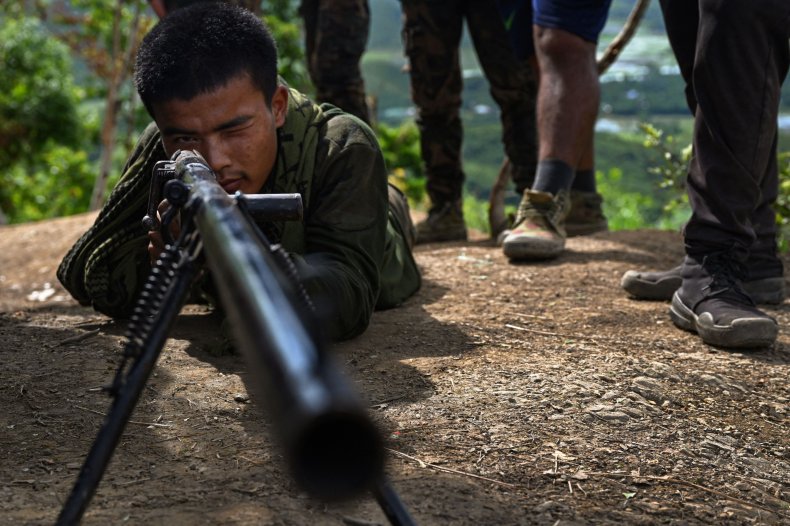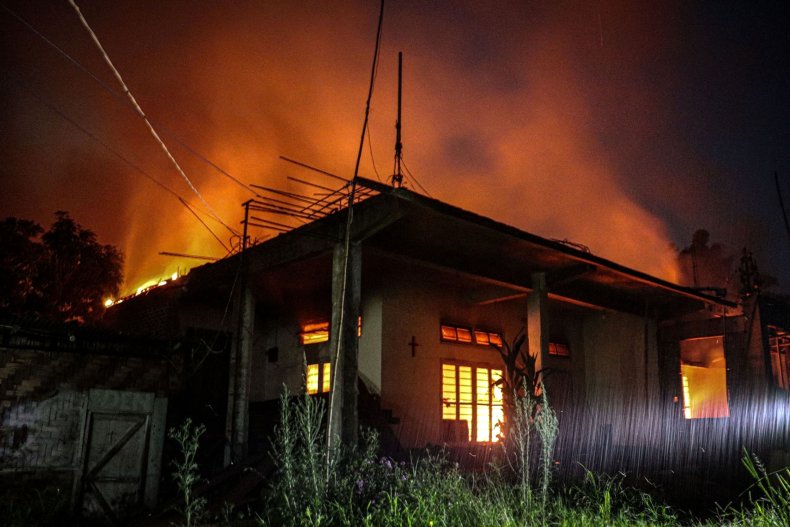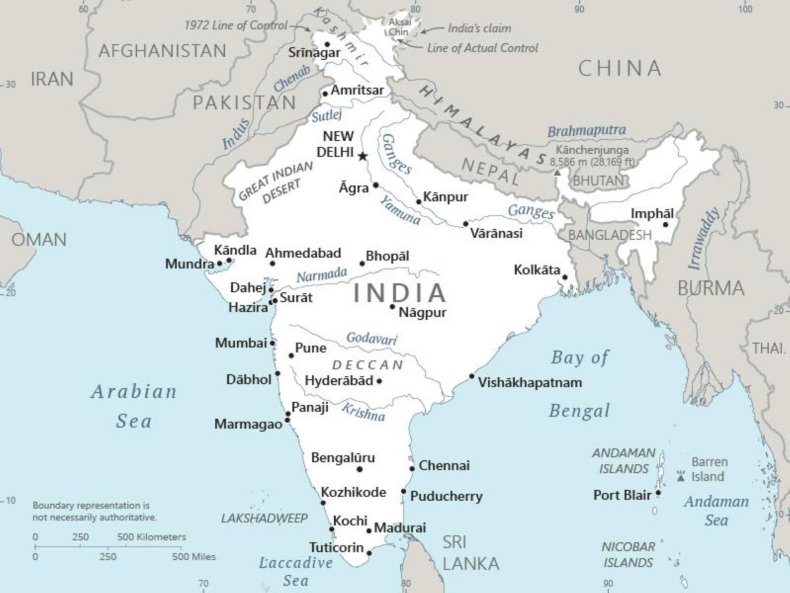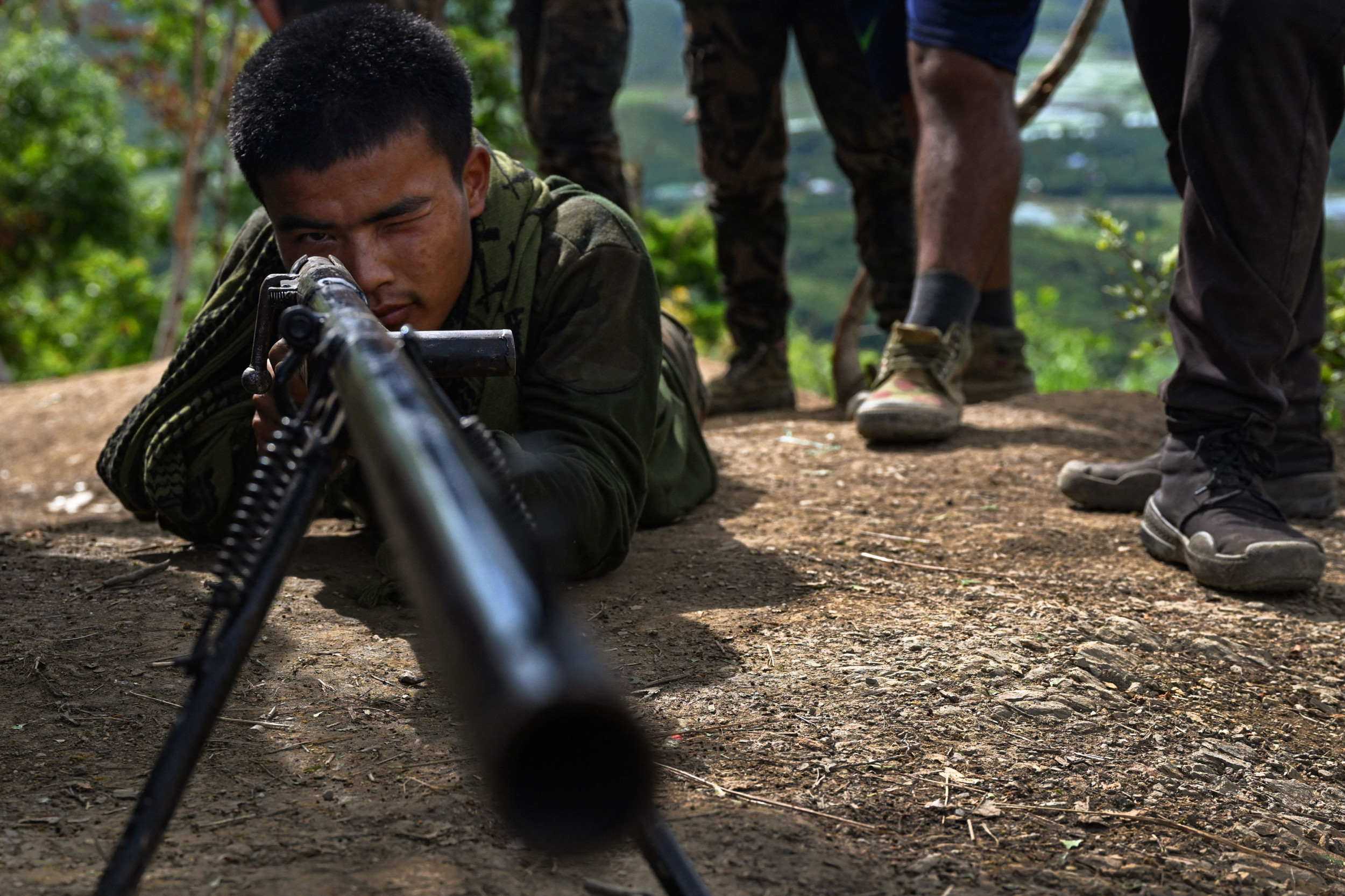beijingwalker
ELITE MEMBER

- Joined
- Nov 4, 2011
- Messages
- 65,191
- Reaction score
- -55
- Country
- Location
India's Violent Border State Crisis Risks Civil War Near China and Myanmar
BY TOM O'CONNORON 8/17/23 AT 5:00 AM EDT
Despite Indian Prime Minister Narendra Modi's assertion that peace is returning to the restive state of Manipur, a lingering risk of civil war erupting in the far northeast threatens to destabilize a strategic frontier along the border with war-torn Myanmar and not far from the disputed boundary with China.
Located some 1,000 miles away from the divided Kashmir region, which continues to serve as India's primary frontline with both Pakistan and China, Manipur saw a dramatic spike in violence in May amid clashes rooted in ethnic and territorial tensions between the majority-Hindu Meitei community on one side and the predominantly Christian Kuki-Zo community on the other.
More than 180 people have since been killed, with widespread reports of arson against homes and religious sites, racially motivated attacks and mass sexual violence targeting women.
Attempts by Indian state security forces, including the Assam Rifles paramilitary outfit, to diffuse the situation have been met with hostility by local police and even supporters of Modi's ruling Bharatiya Janata Party (BJP), further obscuring the path to peace and threatening to push the world's most populous nation to the brink.
"Nowhere else in India in its history have mortars been fired by civilian groups and pitched battles, with bunkers, created by two ethnic groups," Sushant Singh, a senior fellow at the New Delhi-based Centre for Policy Research and two-decade Indian Army veteran, tells Newsweek.
"Though localized," he added, "this is closest to a civil war that India has ever seen."

An armed man claiming to be a volunteer demonstrates the working of a weapon at a makeshift camp on a hilltop at Churachandpur district, a stronghold of the Kuki tribe, in the northeastern state of Manipur, on July 24. Conflict erupted in May between the predominantly Hindu Meitei majority and the mainly Christian Kuki in the northeastern state of Manipur from a complex mix of causes including land ownership and access to jobs.ARUN SANKAR/AFP/GETTY IMAGES
India has faced off with a number of uprisings and insurgencies throughout its 76-year post-colonial history, including ongoing unrest in India-administered Kashmir, where four years ago Modi deployed additional tens of thousands of troops to the estimated 700,000 security personnel already stationed there as he revoked the largely Muslim territory's semi-autonomous status. New Delhi has long blamed Islamabad for supporting militant activity across the Line of Control that divides the two nuclear-armed South Asian rivals, a charge vehemently denied by Pakistani officials.
While tempers in Kashmir too are charged by religious and political factors, the crisis in Manipur has elevated to particularly volatile levels as a result of both deep-rooted local grievances as well as a worsening civil war just across the border in Myanmar. The conflict between the ruling Tatmadaw military and various non-state actors, exacerbated by the ousting and arrest of democratically elected State Counsellor Aung San Suu Kyi in January 2021, has fueled an influx of refugees, including members of the Kuki and broader Zo ethnic group that call parts of both countries—as well as Bangladesh—home.
"The national security risks pertain to instability in the border state that is overlapping on to other states and countries like Myanmar," Sushant Singh said. "That remains the biggest risk emerging from this ongoing crisis. Manipur has been divided on ethnic lines and a large number of soldiers and federal police will be required to keep the situation even at this level."
"The second challenge comes from the very large quantity of lethal weapons that have been taken from police armories and are now with the mobs," he added.
As such, even with a long history of trouble in Manipur, "the current crisis is serious and there are no signs of the situation improving any time soon," according to Sanjib Baruah, a professor at Bard University in New York who specializes in Northeast Indian politics.
But Baruah argued that "it is not just that the Modi government has been unable to stabilize the situation; it has been reluctant to use the standard policy tools available for this purpose." These include the "President's rule" emergency edict employed in Kashmir to give the central government sweeping authorities in a state whose local government has been deemed dysfunctional.
A primary difference in the case of Manipur is that the state leader, Chief Minister Nongthombam Biren Singh, a member of the Meitei community, is an outspoken BJP supporter whose policies speak to the sentiments of some of the more extreme factions of what is estimated to be the largest political party on Earth.
"The Modi government's decision to continue with the status quo can only be seen as strategic from the perspective of the ruling party's Hindu nationalist project," Baruah told Newsweek.
"Hindu nationalist organizations that are allied to the BJP have long viewed the large concentration of Christians in Northeast India as a less than ideal situation that has made the region inhospitable to the message of Hindu nationalism," he added. "Resisting the spread of Christianity, which they view as a 'foreign' religion like Islam—which is, of course, not the view of Indians who practice these faiths—has been a major motivation behind their work in Manipur and neighboring states."
Newsweek has reached out to the Indian Armed Forces, the Indian External Affairs Ministry, the Myanmar Foreign Affairs Ministry as well as spokespersons and national and state offices of the BJP for comment.

Smoke billows from an abandoned house set on fire by arsonists in the state of Manipur, in the state capital of Imphal on August 5. Indian Prime Minister Narendra Modi defeated an August 10 no-confidence measure put forth by his opposition over his handling of the violence in Manipur and he cited "continuous reports of peace" in the state during an August 15 Independence Day address.AFP/GETTY IMAGES
The role played by the BJP and Chief Minister Singh was also highlighted by Makepeace Sitlhou, an independent journalist who has covered India's Northeast for several years.
Sitlhou explained how the Manipur leader had initially presented himself as a proponent of reconciliation between the largely valley-based Meitei and hillside-residing Kuki-Zo, a position that put him at odds with both the BJP and Manipur's Meitei majority. Upon his re-election in 2022, however, she argued that he "switched gears to start appeasing the majoritarian sentiments of the ethnic Meiteis in the valley by profiling the Kuki-Zo tribals as 'poppy cultivators' and 'illegal immigrants,' exploiting the Myanmar refugee crisis even though Manipur has barely borne the brunt of it."
"The situation in the state has not been stabilized because of a clear lack of political will to control the armed mobs and de-escalate the violence, largely because the state government has the protection of the federal government of the same party," Sitlhou told Newsweek. "With general elections slated next year, the BJP government is resorting to playing the old tactic of divisive politics based off of majoritarianism either on religious or ethnic grounds."
And while Modi and the BJP have adopted a tougher stance on China to promote India's broader security concerns regarding the People's Republic, Sitlhou warned that given the robust relations Beijing has managed to forge with Myanmar and other Southeast Asian states that New Delhi has also sought to court, "sustaining these dissatisfactions will be a shot in the arm for the Chinese to train and fund separatist groups, something they have been known to do in the past."
Yun Sun, a senior fellow and co-director of the East Asia Program and director of the China Program at the Washington, D.C.-based Stimson Center, pointed out that Beijing's primary concerns in Northeast India remain outside of Manipur, specifically in Arunachal Pradesh, located further northeast in territory China claims as part of South Tibet.
That being said, she pointed out, "the violence and unrest in Manipur are seen as positive development for China."
"At the minimum, they substantiate the claim that the Indian nation is artificially created, with little cohesiveness or internal solidarity," Yun told Newsweek. "It further implicitly strengthens the Chinese claim that Indian possession of some of the territory in its northeast region is unjust and being fought against by local people, and for China, that certainly applies to the disputed territory."
"China will not go as far as to challenge Indian sovereignty," she added, "but the internal problems revealed by the violence in Manipur undermines India's internal policy and external prominence."
Reached for comment by Newsweek, Chinese Embassy to the United States spokesperson Liu Pengyu declined to comment specifically on tensions involving India and Myanmar, but stated that, "in principle, China's approach to regional peace and stability is consistent."
"We believe that parties concerned need to resolve the issue by political means such as dialogue and consultation," Liu said.
Akash Sahu, an independent policy consultant who specializes in Indo-Pacific geopolitics and Southeast Asian studies, argued that India could actually adapt aspects of China's approach to address the "need to urgently resolve the unfolding violence in Manipur while at the same time rethink its Myanmar policy."
"While the engagement with the junta remains, it may be prudent to diversify its relationships to include other stakeholders in Myanmar's security," Sahu told Newsweek. "A cue can be taken from China's multilayered engagement in Myanmar where it has a sound relationship with the junta, and also maintains close ties with many ethnic armed organizations along the China-Myanmar border region."
Otherwise, a failure to resolve the crisis in Manipur could have far-reaching consequences.

A map of India shows selected cities, including the northeastern Manipur state capital of Imphal, located near the border with Myanmar, formerly known in English as Burma, a name still used by the U.S. government.CENTRAL INTELLIGENCE AGENCY
And yet Washington has increasingly backed New Delhi in its border dispute with Beijing, viewing India as a vital partner to counter China and achieve other geopolitical goals in the region. But even as U.S. President Joe Biden intensified this outreach by hosting Modi at the White House in June, limits have emerged in how close India was willing to go in aligning its policies with those of the U.S.
"The idea that India can be pushed to act a certain way by its Western allies, no matter the power imbalance in question, is a misunderstanding of how India sees itself, which is an autonomous regional giant on its way to becoming a superpower," Saniya Kulkarni, project coordinator at the London School of Economic and Political Science's IDEAS foreign policy think tank, told Newsweek.
This also extends to Washington's desire to see greater pressure from New Delhi against the Tatmadaw in Myanmar, with whom India's relationship "is led by its domestic security concerns foremost, and greater power politics vis-a-vis China is more in the background, although the two factors do work in tandem," according to Kulkarni.
"To get a better read of India's perspective," she added, "it is extremely important to look at its issues from the inside-out, and engagement with Myanmar is inherently centered around what it means domestically."

India's violent border state crisis risks civil war near China and Myanmar
"This is closest to a civil war that India has ever seen," Indian expert and army veteran Sushant Singh tells Newsweek.





